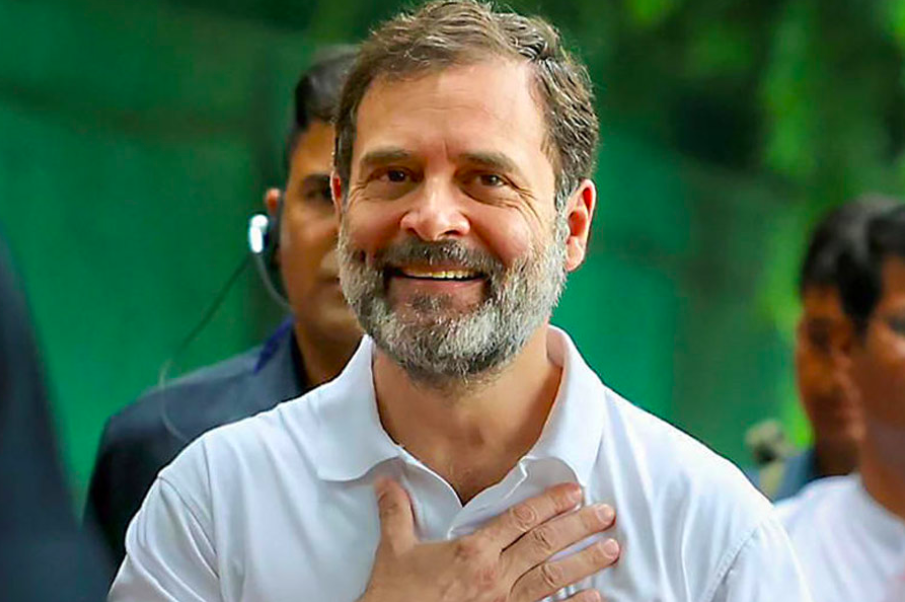Congress leader Rahul Gandhi’s conviction in a criminal defamation case over his ‘Modi surname’ remark was put on hold by the Supreme Court today, which said that while his remarks were not in good taste, his disqualification from parliament would affect his constituents.
The trial judge had awarded the maximum sentence of two years in the case, the top court observed, pointing out that it would not have attracted disqualification as an MP if the sentence was a day lesser.
Rahul Gandhi had in April told a sessions court in Surat his conviction by a magistrate’s court in the 2019 defamation case was erroneous, patently perverse, and he was sentenced in a manner so as to attract disqualification as a Member of Parliament. He had said he was treated harshly by the trial court, which was “overwhelmingly influenced” by his status as an MP.
No doubt that the utterances by the petitioner were not in good taste, the Supreme Court said today, “and the petitioner ought to have been more careful in making speeches”.
“The ramifications of disqualification not just affect the right of the individual but also the electorate,” it said.
This was Rahul Gandhi’s last chance before acquittal, and will allow him to attend the parliament and contest elections, his lawyer earlier argued in the court, adding that the High Court had reserved its judgement for 66 days, and due to conviction in the case, Mr Gandhi has already lost two Parliament sessions.
A Supreme Court bench of Justices BR Gavai, PS Narasimha, and Sanjay Kumar was hearing Rahul Gandhi’s request for a stay on his conviction. The Gujarat High Court had earlier refused to stay his conviction in the criminal defamation case.
Senior Advocate Abhishek Manu Singhvi, representing Rahul Gandhi, said the trial has been completed, and Mr Gandhi has even been convicted, yet there is no evidence so far.
Mr Singhvi said this is the first time 30 crore people have held to be an identifiable class. “They are amorphous, non-homogenous…communities, castes, and groups with appellation ‘Modi’ are totally different,” he said.
Justice Gavai had at the beginning of the hearing said Mr Gandhi will have to make out an exceptional case for a stay on conviction, to which Mr Singhvi said he was not arguing conviction today.
Mr Singhvi argued the complainant Purnesh Modi’s original surname is not Modi, and he had changed it.
“The complainant Purnesh Modi himself said that his original surname was not Modi. He belongs to Modh Vanika Samaj,” he argued, and claimed not a single of the persons Mr Gandhi had named during his speech have sued him.
“Interestingly, everybody who is aggrieved in this very ‘small’ community of 13 crores, the only people suing are BJP office-holders. Very strange,” Mr Singhvi said.
The Supreme Court then pointed out that the trial court has also spoken about Mr Gandhi’s criminal antecedents.
“They have cited 13 cases but no conviction in any of those cases. How are these cited for criminal antecedents? I am not a hardened criminal…No conviction despite…look at the chart. Full of cases filed by BJP karyakartas, but never any conviction,” Mr Singhvi responded.
Advocate Singhvi then pointed out that the High Court treats this as a serious offence involving a moral turpitude.
“Not a single material of moral turpitude. Not a single judgement. This is non-cognisable, bailable, and compoundable. Not against society, not kidnapping, rape, murder…maximum sentence of 2 years… How can this become an offence involving moral turpitude?” he said.
There’s no other case where two years sentence has been given, he added.
Mr Gandhi while maintaining that he was not guilty, on Wednesday requested the top court to stay his two-year conviction, enabling him to participate in the ongoing sittings of the Lok Sabha and sessions thereafter.
At a rally in Karnataka’s Kolar in April 2019, Rahul Gandhi, in a dig at Prime Minister Narendra Modi, said, “How come all the thieves have Modi as the common surname?”.
In an affidavit before the top court, the former Wayanad MP said that he has always maintained that he is not guilty of the offence and that the “conviction is unsustainable” and if he had to apologise and compound the offence, “he would have done it much earlier”.
Rahul Gandhi has challenged the trial court order in the Surat Sessions court, where the appeal is pending.
-With NDTV inputs.





Add Comment